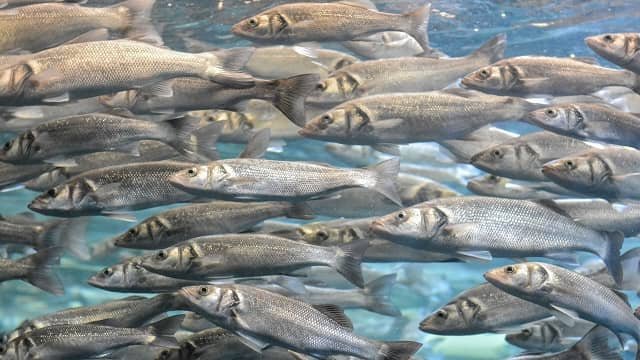
In an attempt to combat animal stress in aquaculture, the Interdisciplinary Centre of Marine and Environmental Research (CIIMAR) proposes a dietary supplement for fish that increases, among other things, serotonin levels, acting as a “stress buffer.” This proposal stems from the doctoral work of student Diogo Peixoto and promises additional benefits, such as strengthening the immune system of these animals.
At a time when the global population is expected to exceed 9.8 billion people by 2050, aquaculture emerges as a solution to human food needs, with the sector growing above the average. However, aquaculture presents many challenges, including maintaining fish welfare.
Animal stress is one of the biggest challenges in aquaculture. This stress is caused by transportation, high stocking densities, overfeeding, water quality, and handling procedures such as sorting and vaccination. It affects animal welfare and can also decrease growth rates and disease resistance. Besides compromising animal health, it also leads to significant economic losses in the sector.
It was in this context that doctoral student Diogo Peixoto, under the guidance of researcher Rita Azeredo from CIIMAR, studied the benefits of supplementing aquaculture fish diets with tryptophan, an essential amino acid that can be metabolized into various compounds, including serotonin, which in humans is known as one of the “happiness hormones.”
The Role of Tryptophan in Combating Stress
“In aquaculture, most of the time, diseases arise after fish have been exposed to a stressful situation. There are several strategies to combat this problem, some more successful than others. In our laboratory, we have used immuno-nutrition as a strategy to improve animal welfare,” explains Benjamín Costas, leader of CIIMAR’s Aquatic Animal Health team and principal investigator of the IMMUNAA project, funded by the Foundation for Science and Technology (FCT), where the doctoral student’s work was integrated.
“The main goal of my PhD was to understand the role of tryptophan in the immune response of sea bass, especially during inflammatory responses and disease resistance,” explains Diogo. To achieve this, different research strategies were applied, all leading to the same conclusion: tryptophan supplementation mitigates the negative effects of stress, maintaining stable energy metabolism and resulting in happier, healthier animals. “Since fish cannot internally synthesize tryptophan, its supplementation in feed is essential,” adds the researcher.
Health Through Nutrition
Today, the concept of improving animal health through better nutrition is widely accepted. This is true for both humans and other animals, and it is also implemented in modern aquaculture. In this regard, “research and innovation efforts have significantly increased in the field of immuno-nutrition. Proper nutrition is essential not only for growth maintenance but also for providing nutrients to the immune system, inflammatory processes, and stress response,” explains Benjamín Costas. “Proper feeds and feeding regimes ensure optimal health, which can be achieved by linking nutrition to immunity, along with other fields such as biochemistry, physiology, microbiology, and pathology,” elaborates Diogo Peixoto.
In aquaculture, the use of supplemented or functional feeds has been implemented by incorporating nutrients that enhance immunity. Functional amino acids, such as tryptophan, are strong candidates for feed supplementation, improving health and survival, and serving as a complementary strategy, for example, to vaccination in aquaculture.
Does More Serotonin Make Fish Happier?
Although there is no scientific evidence that serotonin plays exactly the same role as a “happiness hormone” in fish as it does in humans, tryptophan is an essential amino acid that serves as a precursor to various metabolites, affecting stress response modulation, neurotransmitter/neuromodulator serotonin synthesis, melatonin production, and other molecules that impact animal health and welfare. Additionally, it plays a crucial role in regulating the antioxidant system, behavioral responses, and immune function.
Stay Always Informed
Join our communities to instantly receive the most important news, reports, and analysis from the aquaculture industry.
After intestinal absorption, tryptophan metabolism can be used for protein synthesis and/or metabolized by three enzymes, whose metabolic pathways (serotonin and kynurenine) have important implications for both immune and neuroendocrine responses. Although a direct connection between serotonin production and animal happiness has not been proven, Diogo Peixoto’s work demonstrated that tryptophan supplementation mitigates the negative effects of stress, increasing well-being and immune stability in these animals. In short, they are healthier and happier animals.
Is Supplementation the Same as Medication?
Tryptophan supplementation can be approached from two perspectives: therapeutic or prophylactic/preventive. It can be used therapeutically when administered to fish already under stress (e.g., in high stocking densities). In these cases, “supplemented tryptophan acts on the hypothalamic-pituitary-interrenal axis of fish, reducing stress and thus functioning as a therapy,” explains Diogo. “It can also have a therapeutic effect if administered after the onset of an inflammatory process, helping to downregulate the inflammatory response,” he adds.
However, in aquaculture, fish are exposed to many stress factors due to farming conditions. Even if these conditions are anticipated, fish will still need to be vaccinated, transported, or may eventually fall ill. When fed with tryptophan-supplemented feeds, these fish can better handle such situations, as this amino acid acts as a stress buffer, helping to neutralize its immunosuppressive effects. In this way, tryptophan’s effect can be considered preventive, as its use helps prevent subsequent health problems or ineffective vaccinations. However, this perspective remains a topic of debate within the scientific community.
Editor at the digital magazine AquaHoy. He holds a degree in Aquaculture Biology from the National University of Santa (UNS) and a Master’s degree in Science and Innovation Management from the Polytechnic University of Valencia, with postgraduate diplomas in Business Innovation and Innovation Management. He possesses extensive experience in the aquaculture and fisheries sector, having led the Fisheries Innovation Unit of the National Program for Innovation in Fisheries and Aquaculture (PNIPA). He has served as a senior consultant in technology watch, an innovation project formulator and advisor, and a lecturer at UNS. He is a member of the Peruvian College of Biologists and was recognized by the World Aquaculture Society (WAS) in 2016 for his contribution to aquaculture.







